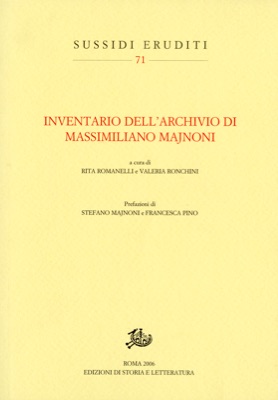
Inventario dell’archivio di Massimiliano Majnoni
Edited by Rita Romanelli and Valeria Ronchini, prefaces by Stefano Majnoni and Francesca Pino Rome, Edizioni di Storia e Letteratura, 2006
Rome, Edizioni di Storia e Letteratura, 2006
In this volume, Intesa Sanpaolo’s Historical Archives celebrate the acquisition of an important personal archive, belonging to bank director Marquis Massimiliano Majnoni, now digitalised and consultable at our Reading Room.
Massimiliano Majnoni (1894-1957), a Liberal-Catholic aristocrat, captain in the Great War who was decorated for bravery, a man of great cultural leanings, genealogist, bibliophile, letter writer and diarist, joined Banca Commerciale Italiana in 1921, heading its Rome delegation between 1935 and 1947: the headquarters of fledgling political movements and crucible for militant anti-Fascism between 1943 and 1945.
The “Max” Majnoni collection belongs to the archives of the aristocratic Majnoni family, with origins in Lombardy and prestigious ties to the court of Savoy, and the Baldovinetti di Poggio family, related to ancient Tuscan nobility and originally merchants by trade; it is kept at their 17th-century villa in Marti, near Pisa, and recognised as being of historical significance by the Archival Superintendence office of Tuscany.
The decision to acquire the collection was inspired not only by its exceptional wealth and integrity, but principally by the unique figure of the Marquis himself.
Between the two World Wars, Majnoni found himself – by accident of birth and by way of his career – in the circles deciding the future of Italy. From the privileged viewpoint of Comit’s Rome delegation, he describes – in his diaries and extensive correspondence with politicians, intellectuals, aristocrats and economists – the history of Italy: from the time of Fascism to the slow, complex reconstruction of the country’s civic and democratic fabric.
While Majnoni was not a protagonist, it is only right to recognise his uncommon ability to pinpoint and describe the personalities and processes of his day, of which he has left us incisive evidence.
The archive is an excellent example of how official paperwork must be given multiple and more personal interpretations. Often, historical events risk being reduced to a list of names, facts and dates unless they are enlightened by evidence not only from their protagonists, but also the people, like Massimiliano Majnoni, who lived through them.